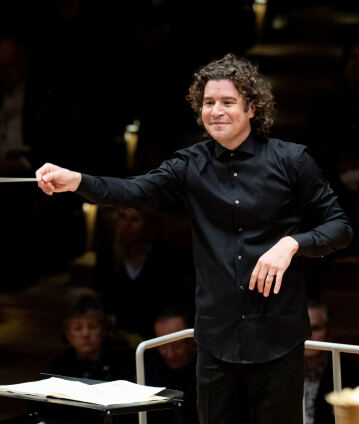Robin Ticciati’s debut with Mahler’s Fourth Symphony

One rarely hears Mahler’s Fourth Symphony so “naturally flowing, without mannerisms, with dazzling pianissimos”, wrote the Berliner Morgenpost about a concert with Robin Ticciati. This – for Mahler – unusually sunny work was on the programme when the music director of the Deutsches Symphonie-Orchester Berlin made his debut with the Philharmoniker. The concert opened with Czech works: Antonín Dvořák’s The Noon Witch and Sinuous Voices by Ondřej Adámek.
Conductor Robin Ticciati makes his debut with the Berliner Philharmoniker with very different music from Bohemia, known today as the Czech Republic: a symphonic poem by Antonín Dvořák, and Gustav Mahler’s Fourth Symphony. Ondřej Adámek’s Sinuous Voices provides a contemporary counterpoint.
Antonín Dvořák’s late works are directly related to his commitment to the cultural independence of his home region. For four of his five symphonic poems, he drew on a collection of Czech ballads. The Noon Witch tells a particularly eerie story: a mother threatens her son that she will call the dreaded Noon Witch as punishment for his naughty behaviour. The witch does indeed appear – and when the father returns home, he finds that the child has died. The composition captivates with its free, narrative form and the striking alternation between peaceful and eerie passages.
Gustav Mahler was strongly influenced by German-Austrian culture – but elements of his Bohemian homeland also form an important part of his tonal language. His Fourth Symphony seems positively classical in comparison to its predecessors: first performed in 1901, the work is in four movements, scored for a comparatively smaller orchestra, and has a cheerful underlying tone. However, at second glance, this symphony also reveals a sophisticated texture and an ambiguity of expression. The finale is Mahler’s orchestral song Vom himmlischen Leben, written in the early 1890s. Here, the soloist sings of the joys of paradise in a touchingly innocent tone.
Ondřej Adámek, who is acclaimed for his seemingly inexhaustible sonic imagination, represents the unbroken vitality of the Czech musical nation in the present day. In his piece Sinuous Voices, he translates words sung by a crowd into orchestral music. According to the composer, the instruments should “whisper, shout and articulate words”.
© 2023 Berlin Phil Media GmbH
Related interviews
Artists
Our recommendations
- Honegger’s “Jeanne d’Arc au bûcher” with Alan Gilbert and Marion Cotillard
- Emmanuelle Haïm conducts an early Handel oratorio
- Jakub Hrůša conducts Bruckner’s Fourth and a world premiere
- Family concert: “Grandpa’s journey”
- Alan Gilbert and Joshua Bell
- Simon Rattle conducts Bernstein’s “Wonderful Town” at the 2002 New Year’s Eve Concert